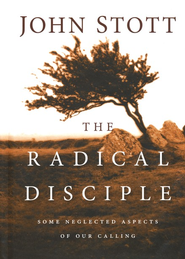John Stott: The Radical Disciple
 John Stott, The Radical Disciple: Some Neglected Aspects of Our Calling (Downers Grove, IL: InterVarsity, 2010), 144 pages, ISBN 9780830838479.
John Stott, The Radical Disciple: Some Neglected Aspects of Our Calling (Downers Grove, IL: InterVarsity, 2010), 144 pages, ISBN 9780830838479.
The name of John Stott is widely known in the evangelical world. He was one of the most respected leaders in Christianity. For many years he served as pastor of All Souls Church in London, England. The thing that made him well-known to the wider Christian world was his writing. Dr. Stott was certainly one of the most prolific evangelical writers prior to his death in July 2011. The Radical Disciple is his last published book.
This is one of Stott’s shorter books; however, while it is relatively short in length it is not short on substance. This book contains the words of a man who has thought much about what it means to be a Christian and what is important in the Christian life. In The Radical Disciple Stott addresses eight areas of discipleship that he feels are often neglected but need to be taken seriously (pg. 16). The topics that he covers are: nonconformity, Christlikeness, maturity, creation care, simplicity, balance, dependence, and death.
In chapter one, “Nonconformity,” Stott warns Christians about being like the world. Specifically, he addresses the challenges of pluralism, materialism, relativism, and narcissism. After telling us what we should not conform to the author tells us whom we should conform to: we are to be like Christ. In chapter two, “Christlikeness,” Stott tells us that we are to be like Jesus in His incarnation, service, love, patient endurance, and mission. In this chapter he also tells us that suffering helps us to be like Christ, that the effectiveness of our evangelism is related to how much like Christ we are, and that the ministry of the Holy Spirit is necessary in order for us to be like Christ. Chapter three, “Maturity,” deals with the need for the growth of the believer. Christians need to have some spiritual substance. One may be surprised to see chapter four, “Creation Care,” included in this book. While concern for the environment is not a subject we frequently hear in the church, it is a subject that the scriptures address. “Simplicity” is the subject of chapter five. In this chapter Stott reproduces a rather long document called “The Evangelical Commitment to Simple Lifestyle.” This document came out of The International Consultation on Simple Lifestyle and covers topics such as these: the church as the new community, the need for a simple personal lifestyle, international development, justice and politics, evangelism, and the Lord’s return. Chapter six is titled, “Balance” and here Stott looks at a number of images in Scripture that refer to believers: babies, living stones, holy priests, God’s own people, aliens and strangers, and servants. He tells us what can be learned from these images regarding the kind of people we are to be. Chapter seven is “Dependence” and in this chapter Stott tells us that dependence is the only appropriate attitude for the radical disciple (pg. 109). This is a very personal chapter in which the author shares a very difficult time in his own life. Chapter eight is “Death,” in this chapter Stott traces the themes of death and life as they relate to salvation, discipleship, mission, persecution, martyrdom, and mortality. In all of them, he says, death leads to life.
Category: Living the Faith, Pneuma Review, Spring 2012


